
To begin confronting anti-Black racism in Toronto, City Council unanimously adopted the Five-Year Toronto Action Plan to Confront Anti-Black Racism on December 5, 2017. The Five-Year Action Plan came to an end in December 2023, providing an important foundation to inform the next decade of action. Great progress was made within the Five-Year Action Plan, but further advancements are needed.
To build on the successes of the City of Toronto’s first Action Plan, Toronto City Council approved the recommendation to develop a renewed 10-Year Toronto Action Plan to Confront Anti-Black Racism on June 14, 2023.
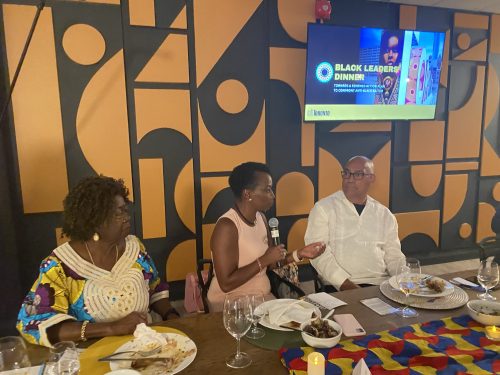 As part of the City of Toronto’s ongoing efforts to develop the 10-Year Action Plan to Confront Anti-Black Racism, the CABR Unit partnered with the CEE Centre for Young Black Professionals to host a pivotal Black Leaders Dinner.
As part of the City of Toronto’s ongoing efforts to develop the 10-Year Action Plan to Confront Anti-Black Racism, the CABR Unit partnered with the CEE Centre for Young Black Professionals to host a pivotal Black Leaders Dinner.
Bringing together influential Black leaders from different generations and diverse sectors across Toronto, this historic roundtable fostered deep discussions on the challenges, resilience, and aspirations of Toronto’s Black communities. Leaders shared insights on progress made, ongoing barriers, and the collective vision needed to drive lasting change.
Follow this link to view the highlights of this powerful conversation.
Black Torontonians (people of African descent or origin, African Black Caribbean, African-Canadian, Canadians of African descent) are contributing to all areas of city life; adding their talents and assets to make Toronto stronger, more vibrant, and more successful.
However, studies continue to show that anti-Black racism still has detrimental impacts on the life and work of Black people in our city.
Anti-Black racism is embedded in Canadian institutions though policies and practices that reflect and reinforce negative beliefs, attitudes, prejudice, stereotyping and/or discrimination directed toward people of African descent, and their unique history and experience of enslavement and colonization here in Canada.
As the government closest to the people, the City of Toronto recognizes its responsibility to create a city that works for all residents. Confronting and removing barriers caused by anti-Black racism benefits all Torontonians, especially other Toronto communities experiencing racism and marginalization.
The Five-Year Toronto Action Plan to Confront Anti-Black Racism was the result of a collaborative effort between the City of Toronto and Torontonians of African descent. The Five-Year Action Plan was grounded in 41 years of reports and recommendations on anti-Black racism, 41 community conversations in partnership with 18 community agencies, and engagement from over 800 members of Toronto’s diverse Black communities.
Read the Five Year Toronto Action Plan to Confront Anti-Black Racism.
The Five-Year Action Plan outlines 22 recommendations and 80 actions across five issue areas that work to dismantle systemic barriers and create meaningful systemic change to benefit all of Toronto’s communities. The Action Plan is SMART (Strategic and Specific, Measurable, Achievable, Relevant and Realistic, and Timely). Most importantly, it responds to the priorities identified by Toronto’s diverse Black communities.
The Confronting Anti-Black Racism (CABR) Unit is responsible for the implementation of the Action Plan to Confront Anti-Black Racism. The vision of the CABR Unit is to act as model for change, not only for equity and inclusion of Black people, but for other groups who are racialized and marginalized in Toronto. The mission of the CABR Unit is to work with City divisions, agencies, and commissions to drive transformative systems change in policy and practice across Toronto.
In leading the implementation of the Toronto Action Plan Confront Anti-Black Racism, the CABR Unit works to support cross-divisional efforts to identify and remove systemic barriers experienced by Black Torontonians, and ensure that municipal services, spaces and policies are fully inclusive and accessible to Black Torontonians.
Applying the equity framework of targeted universalism, the CABR Unit is working to ensure the removal of systemic barriers for Black communities, as well by the most disadvantaged communities, which can create benefits for all residents in the City of Toronto.
The chart below captures the Year Five actions from the Five-Year Toronto Action Plan to Confront Anti-Black Racism. The CABR Unit continues to work with the City’s Agencies, Boards, Commissions and Divisions to track, evaluate and report out on the status of actions. Previous council and committee reports are also available for review.
| Priorities | Rec. # | Key Deliverables |
|---|---|---|
| 1. Advancing Cultural Change at the City
Year Five will prioritize the development of community-informed best practice models to enhance organizational well-being, training and employment, and Black leadership to inform the collection of internal and external disaggregated race-based data. These models will support the City to drive targeted changes to address Black staff retention, complaints, and professional growth and increase accountability in data collection and governance to inform responsive strategies, services, and supports to reduce inequities and advance inclusivity. |
#1.1 | Develop and implement training on effective programming for Black children and youth, through an Anti-Black Racism Lens. |
| #1.4 | Increase hiring of Black Torontonians and partnerships with diverse Black communities to ensure that children and youth programs reflect the diversity of the communities they serve. | |
| #6.1 | Outreach, recruit, and hire from diverse Black communities to increase number and retention of health, social and community workers of African descent. | |
| #6.2 | Develop and implement an outreach initiative to recruit and train diverse Black Torontonians for leadership and governance roles in health and community organizations. | |
| #6.3 | Coordinate with funders to require the collection and public reporting of health and community service data disaggregated by race and other characteristics. | |
| #6.4 | Coordinate with funders to invest in community capacity to comply with the collection of data disaggregated by race. | |
| #10.5 | Collect race-based data on homelessness, particularly on the needs of Black queer and trans youth for shelters support services planning. | |
| #11.1 | Outreach, recruit, and hire diverse Black people to increase the number and retention of employees of African descent at the City of Toronto. | |
| #11.2 | Engage diverse Black experts and community members to develop Anti-Black Racism training for City staff and leaders. | |
| #11.4 | Enhance current City internship programs to include youth of African descent, including Black queer and trans youth. | |
| #12.1 | Leverage federal and provincial funding to create mentorship programs for Black youth to support skill development and the building of professional networks. | |
| #19.4 | Review and revise the City’s complaint processes to ensure that anti-Black racism is addressed at all phases and is aligned with related City instruments, policies, and regulations. | |
| #19.5 | Advertise the City’s complaint processes in communities of African descent. | |
| 2. Targeted Services, Programs and Spaces
Year Five will enhance and invest in service coordination and planning to deliver more intersectional and targeted services and programs, in collaboration with Black communities, organizations, and institutional partners. Efforts will seek to respond to health outcomes linked to structural determinants of health across housing, food security, education, community services and community safety. |
#1.2 | Increase supply and variety of culturally appropriate before- and after-school programs with clear learning objectives, including STEAM (science, technology, engineering, arts, and math) programs. |
| #4.2 | Work collaboratively with Black communities and the Province to leverage Black cultural knowledge to lead and provide more mental health services across the city for Torontonians of African descent, including clinics, on-call counsellors, harm reduction programs and supports for post-traumatic stress disorder. | |
| #5.2 | Replicate and expand effective models of Black-led health and community services to under-served neighborhoods and populations of Black Torontonians. | |
| #9.2 | Increase settlement sector knowledge of programs and services for Black newcomers. | |
| #9.3 | Ensure Black newcomers are represented in the Toronto Newcomer Strategy and the Integrating Cities Charter. | |
| #9.6 | Provide culturally appropriate supports to address violence against women in Francophone communities. | |
| #10.6 | Create safe spaces within women’s and family shelters for Black women. | |
| #10.7 | Apply an Anti-Black Racism Analysis to the Rent Supplement provision process to support equitable access to rent supplement program. | |
| #10.8 | Apply an Anti-Black Racism Analysis to the Eviction Prevention Framework in the 2017-2018 Eviction Prevention Strategy. | |
| #13.3 | Provide free police reference checks, training, and certifications for Black youth to access volunteering and entry-level jobs. | |
| #14.1 | Continue to advocate to the Ontario government to raise social assistance rates. | |
| #20.2 | Conduct an audit using an Anti-Black Racism Analysis to evaluate City spaces and programs. | |
| 3. Economic Prosperity & Community Funding
Year Five will build on investments made to develop and deliver partnerships, funding, and policy frameworks to support Black-owned and operated businesses, Black-led and serving organizations, and grassroots groups to grow and thrive in place. Efforts will combat anti-displacement and mobilize institutional levers, such as culturally informed inclusive economic development and neighbourhood planning, community benefits, social procurement, community land trusts and the continued development and use of prosperity pathways, including the Black Mandated Funding Framework. |
#15.3 | Target development supports for businesses owned by Black women, Francophones, and people who were formerly incarcerated. |
| #20.1 | Leverage City spaces to create a Black community hub in partnership with Black service providers. | |
| 4. Community Safety, Justice, and Well-Being
Year Five will focus on strengthening the institutional capacity to remove systemic barriers across the justice system and increase transparency in reporting and communications through the engagement of community advisories. This will include investments in upstream, trauma-informed, and community-centered approaches to enforcement and police responses, community centered approaches to safety, and restorative and reparative practices to ensure justice, and healing for Black communities. |
#13.6 | Advocate to the provincial and federal governments to remove barriers to applying for criminal record suspensions. |
| #16.3 | Review use of force protocols from an Anti-Black Racism Analysis. | |
| #16.6 | Strengthen protocols for police response to Emotionally Disturbed Persons (EDP) and report regularly on police-EDP interactions, using an Anti-Black Racism Analysis. | |
| #16.7 | Communicate to the Province the need for improvements to Policing and the Justice System to better serve and protect Black people. | |
| #17.1 | Mandate the collection and public reporting of race-based data for greater transparency. | |
| #17.3 | Strengthen community capacity to report and police capacity to investigate Islamophobic, transphobic and anti-Black hate crimes through a Community Police Hate Crimes Advisory Committee. | |
| #18.2 | Use an Anti-Black Racism Analysis to develop and implement alternative models of policing that focus on community engagement. |
Investments in the delivery of the Toronto Action Plan to Confront Anti-Black Racism has totaled $33.3 million, since its launch in 2018. Projects in 2022 delivered $7.6 million investment to advance the action plan between January and December. Over that time resources have been directed to community partnerships, youth employment, capacity building programs, Black arts, culture, and heritage initiatives.
In 2023, the City made the following investments to support areas of responsive and culturally relevant childcare, employment initiatives, programs and supports, community economic development and cultural arts projects and social infrastructure and neighbourhood redevelopment planning to confront anti-Black racism:
The Confronting Anti-Black Racism Advisory Committee established by City Council helps to further advance the objectives of the Toronto Action Plan to Confronting Anti-Black Racism. You can follow the issues and priorities the Advisory Committee will address on the Toronto City Council and Committees Meetings, Agendas and Minutes web page.
Below are brief biographies for the members of the committee.
Read about Councillor Amber Morley on her Councillor page.
 Efia is a community member, mother of three, entrepreneur, advocate, agent of social of change and public speaker. Efia is the co-founder of Black Lives For Change and organization set on bettering the lives of Black people in our community. The owner of African Royalty, which started in 2014, focuses on bringing the culture of Ghana to the Western world, and educating others on the beauty and history of West African culture with a modern twist.
Efia is a community member, mother of three, entrepreneur, advocate, agent of social of change and public speaker. Efia is the co-founder of Black Lives For Change and organization set on bettering the lives of Black people in our community. The owner of African Royalty, which started in 2014, focuses on bringing the culture of Ghana to the Western world, and educating others on the beauty and history of West African culture with a modern twist.
 Halimo is a Somali-Canadian critical social worker practicing with diverse and racialized communities in Toronto. Halimo is also the Executive Director of Shifting Ways, an agency that provides critical workshops, research and resources on topics including intersectionality, race, gun violence, trauma, migration process, vicarious trauma, and challenges/ opportunities for racialized families and newcomers to Canada. Halimo works across many fields, including forensics, mental health, settlement, and academia. In her positions as a hospital and community worker, as well as a university lecturer at York University, Halimo champions a critical and intersectional lens that honours the lived experience of her clients and students.
Halimo is a Somali-Canadian critical social worker practicing with diverse and racialized communities in Toronto. Halimo is also the Executive Director of Shifting Ways, an agency that provides critical workshops, research and resources on topics including intersectionality, race, gun violence, trauma, migration process, vicarious trauma, and challenges/ opportunities for racialized families and newcomers to Canada. Halimo works across many fields, including forensics, mental health, settlement, and academia. In her positions as a hospital and community worker, as well as a university lecturer at York University, Halimo champions a critical and intersectional lens that honours the lived experience of her clients and students.
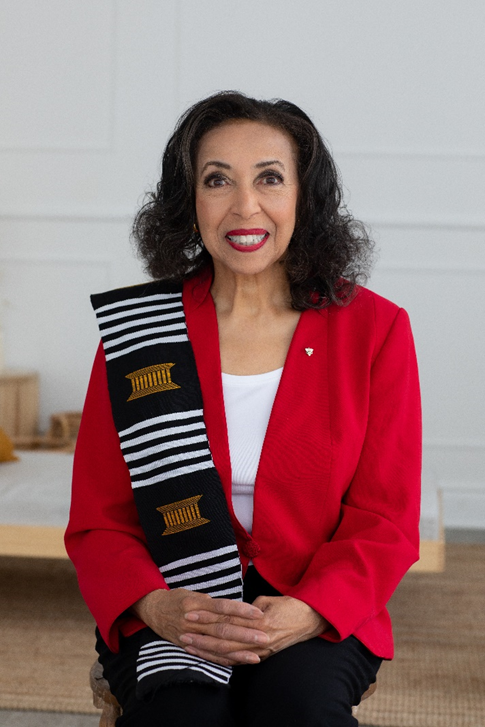 Rosemary Sadlier, O Ont (Order of Ontario) is a social justice advocate, researcher, writer, author, consultant and international speaker on Black History, anti-racism and women’s issues. She is the past President, serving for 22 years as the unpaid leader of the Ontario Black History Society. She was the driving force of all secured commemorations of February as Black History Month, and she initiated and championed August 1st as Emancipation Day since 1995. Rosemary is dedicated to social justice through education and action.
Rosemary Sadlier, O Ont (Order of Ontario) is a social justice advocate, researcher, writer, author, consultant and international speaker on Black History, anti-racism and women’s issues. She is the past President, serving for 22 years as the unpaid leader of the Ontario Black History Society. She was the driving force of all secured commemorations of February as Black History Month, and she initiated and championed August 1st as Emancipation Day since 1995. Rosemary is dedicated to social justice through education and action.
 Lucina works in public health policy with the Public Health Agency of Canada, where she currently supports community capacity for transformative, systemic interventions against social inequities on a cross-sectoral scale. She is a recent Master of Public Health graduate whose past and present advocacy work lie at the intersections of racial justice and health geography, urban placemaking and sustainability, housing access and gentrification, and creative modalities of sociocultural resistance.
Lucina works in public health policy with the Public Health Agency of Canada, where she currently supports community capacity for transformative, systemic interventions against social inequities on a cross-sectoral scale. She is a recent Master of Public Health graduate whose past and present advocacy work lie at the intersections of racial justice and health geography, urban placemaking and sustainability, housing access and gentrification, and creative modalities of sociocultural resistance.
 Salma is a Master of Public Policy candidate at the Munk School of Global Affairs and Public Policy, having previously obtained an Honours Bachelor of Arts from the University of Toronto. She is passionate about policymaking that addresses systemic issues and advances the interests of marginalized communities, working towards a more equitable and just future for all. Salma is deeply committed to creating an inclusive society that values every member and recognizes their contributions.
Salma is a Master of Public Policy candidate at the Munk School of Global Affairs and Public Policy, having previously obtained an Honours Bachelor of Arts from the University of Toronto. She is passionate about policymaking that addresses systemic issues and advances the interests of marginalized communities, working towards a more equitable and just future for all. Salma is deeply committed to creating an inclusive society that values every member and recognizes their contributions.
 George is a Green Career Specialist with niche sustainability consulting experience. As a Black Male, he has several systemic barriers. He noticed a lack of representation, active inclusion, and leadership within sustainability from BIPOC communities (Black, Indigenous, and People of Color). His focus has been and will always be championing Climate Justice based initiatives that not only inspire Black folks but also empower them to act. Collaboration is key; “If not now…Then When?”
George is a Green Career Specialist with niche sustainability consulting experience. As a Black Male, he has several systemic barriers. He noticed a lack of representation, active inclusion, and leadership within sustainability from BIPOC communities (Black, Indigenous, and People of Color). His focus has been and will always be championing Climate Justice based initiatives that not only inspire Black folks but also empower them to act. Collaboration is key; “If not now…Then When?”
 Walied has lived in Regent Park with his family since 2005. He is known for working with residents from all backgrounds to create safe, inclusive, sustainable communities that are free from discrimination and hate. As a Canadian Muslim who immigrated from Sudan, he has experienced firsthand what it’s like to be a newcomer youth growing up in Toronto. He has worked to champion issues such as affordable housing, transit, environmental stewardship, equity, and human rights across the City of Toronto.
Walied has lived in Regent Park with his family since 2005. He is known for working with residents from all backgrounds to create safe, inclusive, sustainable communities that are free from discrimination and hate. As a Canadian Muslim who immigrated from Sudan, he has experienced firsthand what it’s like to be a newcomer youth growing up in Toronto. He has worked to champion issues such as affordable housing, transit, environmental stewardship, equity, and human rights across the City of Toronto.
 Beverly-Jean holds a Ph.D. in Sociology and Equity Studies in Education, a Masters in Counselling Psychology (University of Toronto), and a Bachelor of Arts – Honours (York University). For more than 35 years her academic work has investigated and conceptualized the entanglements of race and racialization as connected to urban education.
Beverly-Jean holds a Ph.D. in Sociology and Equity Studies in Education, a Masters in Counselling Psychology (University of Toronto), and a Bachelor of Arts – Honours (York University). For more than 35 years her academic work has investigated and conceptualized the entanglements of race and racialization as connected to urban education.
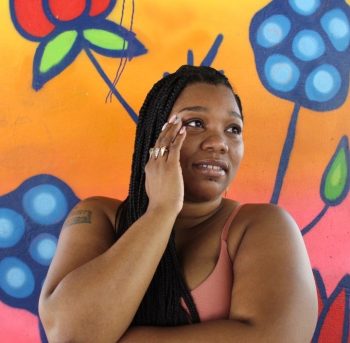 Queen (pronouns: they/she) is a Black, Gender-Queer, Neurodivergent, Creative Technology Artist, and award winning scholar whose practice encompasses Queer theory, Afrofuturism, and Noetic sciences. Queen is also the Founding co-lead of Oddside Arts and has been serving the community for 20+ years, combating structural violence against Black and Indigenous youth through youth service resources, arts education programs in schools, community centres and justice advocacy.
Queen (pronouns: they/she) is a Black, Gender-Queer, Neurodivergent, Creative Technology Artist, and award winning scholar whose practice encompasses Queer theory, Afrofuturism, and Noetic sciences. Queen is also the Founding co-lead of Oddside Arts and has been serving the community for 20+ years, combating structural violence against Black and Indigenous youth through youth service resources, arts education programs in schools, community centres and justice advocacy.
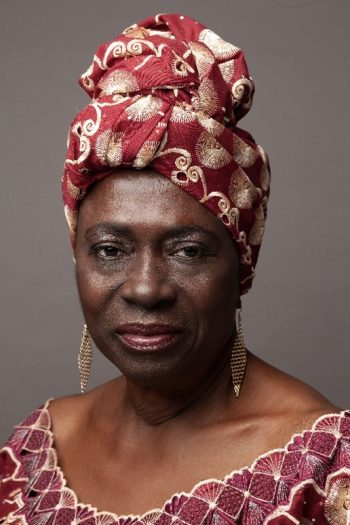 As a retiree, Charis Newton-Thompson graduated from Ontario Institute for Studies in Education of the University of Toronto with a Ph.D. in 2020. Her focus was the mentorship experiences of Black female administrators in Southern Ontario Public Secondary Schools. She was employed as an educator in Guyana, Jamaica, and Canada for over 30 years. Charis began volunteering in Toronto with the Black Education Project as a tutor/mentor over 45 years ago. Currently she continues her advocacy work with organizations such as Canadian Alliance of Black Educators.
As a retiree, Charis Newton-Thompson graduated from Ontario Institute for Studies in Education of the University of Toronto with a Ph.D. in 2020. Her focus was the mentorship experiences of Black female administrators in Southern Ontario Public Secondary Schools. She was employed as an educator in Guyana, Jamaica, and Canada for over 30 years. Charis began volunteering in Toronto with the Black Education Project as a tutor/mentor over 45 years ago. Currently she continues her advocacy work with organizations such as Canadian Alliance of Black Educators.
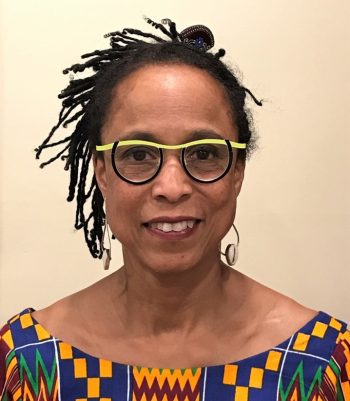 Kathy is Interim Dean, Faculty of Design, OCAD University. Her background merges visual arts and health. Her visual storytelling celebrates Black culture and the Black family. She has a Ph.D. in Pharmaceutical Sciences, master’s Public Health and is a Fellow at WHO Collaborating Centre for Governance, Accountability and Transparency in the Pharmaceutical Sector, Univ. of Toronto. She uses decolonized frameworks to examine governance, policy to foster wholistic health, inclusive neighbourhoods and equity. As a member of the Solid Black Collective she mentors Black youth.
Kathy is Interim Dean, Faculty of Design, OCAD University. Her background merges visual arts and health. Her visual storytelling celebrates Black culture and the Black family. She has a Ph.D. in Pharmaceutical Sciences, master’s Public Health and is a Fellow at WHO Collaborating Centre for Governance, Accountability and Transparency in the Pharmaceutical Sector, Univ. of Toronto. She uses decolonized frameworks to examine governance, policy to foster wholistic health, inclusive neighbourhoods and equity. As a member of the Solid Black Collective she mentors Black youth.
 Maymuna (May) is a writer, illustrator and arts-educator based out of Tkaronto. In her role as an arts-educator, she facilitates & manages programs that use narrative-based art approaches to reclaim power and spark meaningful conversations. She has opened for The Roots and Shane Koyczan with her poems. She manages the IMARA Generation Project, an Afrocentric mental health literacy training program that serves Black youth, parents, faith-based leaders & service providers in the GTA.
Maymuna (May) is a writer, illustrator and arts-educator based out of Tkaronto. In her role as an arts-educator, she facilitates & manages programs that use narrative-based art approaches to reclaim power and spark meaningful conversations. She has opened for The Roots and Shane Koyczan with her poems. She manages the IMARA Generation Project, an Afrocentric mental health literacy training program that serves Black youth, parents, faith-based leaders & service providers in the GTA.
 William has worked in the Canadian Health Care sector with different Organizations like Carelinks, Canadian Red Cross and African and Caribbean Council on HIV/AIDS in Ontario, addressing barriers and inequities in service delivery experienced by African, Caribbean, and Black communities. Physician by training, Amanyire holds an Executive certification in Advanced Health care Leadership, masters of Public Health, a Doctor of Medicine, a PGD in Health Administration and a Diploma in Clinical Medicine and Community Health.
William has worked in the Canadian Health Care sector with different Organizations like Carelinks, Canadian Red Cross and African and Caribbean Council on HIV/AIDS in Ontario, addressing barriers and inequities in service delivery experienced by African, Caribbean, and Black communities. Physician by training, Amanyire holds an Executive certification in Advanced Health care Leadership, masters of Public Health, a Doctor of Medicine, a PGD in Health Administration and a Diploma in Clinical Medicine and Community Health.
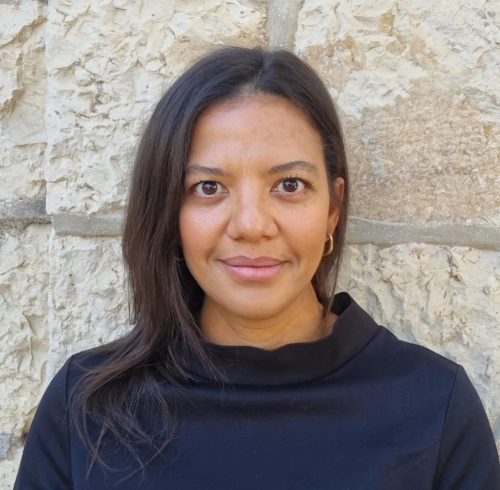
Shannon is a multidisciplinary urban designer and community development planner who has spent more than a decade working in collaboration with communities across the globe. She has extensive experience managing projects and developing policy and best practice frameworks working with citizen groups, local governments and NGOs in North America, West Africa, Europe and Southeast Asia. Before returning to Toronto, Shannon was based in Jerusalem, working on issues of contested urban space and raising her young daughter.
In her role as Director of Programs and Development, Shannon brings strong project management, community engagement and facilitation, applied strategic and systems thinking, storytelling, research, and analysis skills to the organization, as well as a passion and skill for urban design. Shannon has created audio and performative urban art installations using the intangible elements of memory and culture to question public space and the forces that have shaped it; this work has sparked dialogue and attempted to create future urban possibilities. Shannon holds a MSc in Building and Urban Design from The Bartlett School of Planning at University College London and a BA in Development Studies and Economics from McGill University.
The Anti-Black Racism Partnership & Accountability Circle (PAC) is comprised of twelve diverse Torontonians of African descent to support the implementation of the Toronto Action Plan to Confront Anti-Black Racism in effective, collaborative and accountable ways.
Through direct and ongoing engagement with the CABR Unit, the PAC partners with the City on municipal efforts to help the City better serve Torontonians of African descent.
More information on the PAC can be found on a dedicated page for the Partnership & Accountability Circle.
Learn more about anti-Black racism locally and globally. Additionally, find information on municipal and international campaigns and initiatives dedicated to combating anti-Black racism and promoting the advancement of people of African descent.
More information on local and international campaigns, initiatives and resources can be found on a dedicated page for Anti-Black Racism Resources.
The African Ancestral Acknowledgement Statement is a voluntary recognition offered to support Black staff wishing to acknowledge their ancestors of African descent who have been present and actively contributing to life on Treaty lands and traditional Indigenous territories. For more information on this acknowledgement and how and when it should be used, please review this African Ancestral Acknowledgement Guidance developed by the CABR Unit.
The CABR Unit has developed an Anti-Black Racism Analysis Tool for the City of Toronto to ensure municipal services, spaces and policies are fully inclusive and accessible to Black Torontonians. This tool is once offered once an introductory training is delivered through the CABR Unit. In this context, the Anti-Black Racism Analysis Tool can be used to guide conversations and implemented by senior leadership to uncover and review processes and practices that are anti-Black in design, delivery and impact.
The CABR Unit’s work is guided by the African principle, Ubuntu: “I am because you are.” This principle has guided the Unit’s work to influence, promote and activate social harmony and affirmation of Black communities by identifying and removing barriers, and improving access to opportunities for Black residents of Toronto. To this end, the CABR Unit has developed the UBUNTU Framework. This framework assists us in carefully reflecting on how change happens and how it needs to happen in the future.
Subscribe to receive periodic email updates.
Please type (do not copy and paste) your email address:
You will receive an email confirming your wish to subscribe.
Click to unsubscribe.